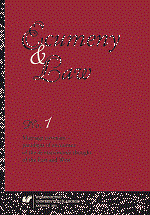The Mixed Marriages According to the Orthodox Canonical Legislation
The Mixed Marriages According to the Orthodox Canonical Legislation
Author(s): Nicolae V. Dură, Teodosie PetrescuSubject(s): Christian Theology and Religion
Published by: Wydawnictwo Uniwersytetu Śląskiego
Keywords: the mixed marriages, Privilegium Paulinum, oikonomia, wedding ceremony, interconfessional weddings, interreligious weddings
Summary/Abstract: In the light of the cannonical testimonies and of the last resolutions taken by the ¬Orthodox Church, we can outline the following: 1. Interconfessional and interreligious weddings are forbidden. 2. In case they are tolerated, by the enforcement of oikonomia, the wedding ceremony must be performed in the Orthodox Church by the Orthodox priest. 3. The enforcement possibilities and forms of oikonomia depend on the practical nece¬ssities of every local Orthodox Church, which has the right of decision in judging every particular case. 4. The children resulting from such a marriage must be baptised and educated in the Orthodox faith. 5. According to Privilegium Paulinum (I Cor. VII, 12—16), the mixed marriage is only allowed in case it was sealed before one of the spouses having been christianised. 6. On the basis of the provision of Canons 10 of Laodicea and 23 of Saint John the Faster, the marriage of a Christian Orthodox with a person of another faith is forbidden. 7. The Canons 31 of Laodicea and 14 of the IVth ecumenical Council allow the marriage between a Christian Orthodox and a heterodox person, under the condition that the heterodox spouse solemnly vows – when contracting the marriage – that he or she will convert to Orthodoxy. 8. The Canon 72 of the Trulan Synod (691 – 692) – which homogenized the canonical practice up to that time regarding mixed marriages – strictly forbids such marriages, under the threat of excommunication. Considering them null, the same canon bestows upon the Privilegium Paulinum the power of a universally binding law, in the sense that the spouse who became Christian – after contracting the respective marriage – „should not give up his or her religion/separate from the other spouse”. Not long ago, the Romanian Orthodox Church suggested „the establishment of a permanent Synod of the fourteen autocephalous Churches with the purpose of ensuring a better coherence of their doctrinary and discipli¬nary resolutions”. Beyond doubt, such a permanent panorthodox synod could solve many of the problems that the Orthodox Church is facing at present, among which, on a top place, we shall mention the issue of mixed marriages, the definitive solving of which was postponed once with the meeting of the future Holy and Great Synod. Unfortunately, the realistic and salutary proposal of our Church was not yet put into practice and the themes of the future Holy and Great Synod will never approach and solve the multitude of problems that the Orthodoxy of our days is confronted with.
Journal: Ecumeny and Law
- Issue Year: 2013
- Issue No: 1
- Page Range: 117-129
- Page Count: 13
- Language: English

